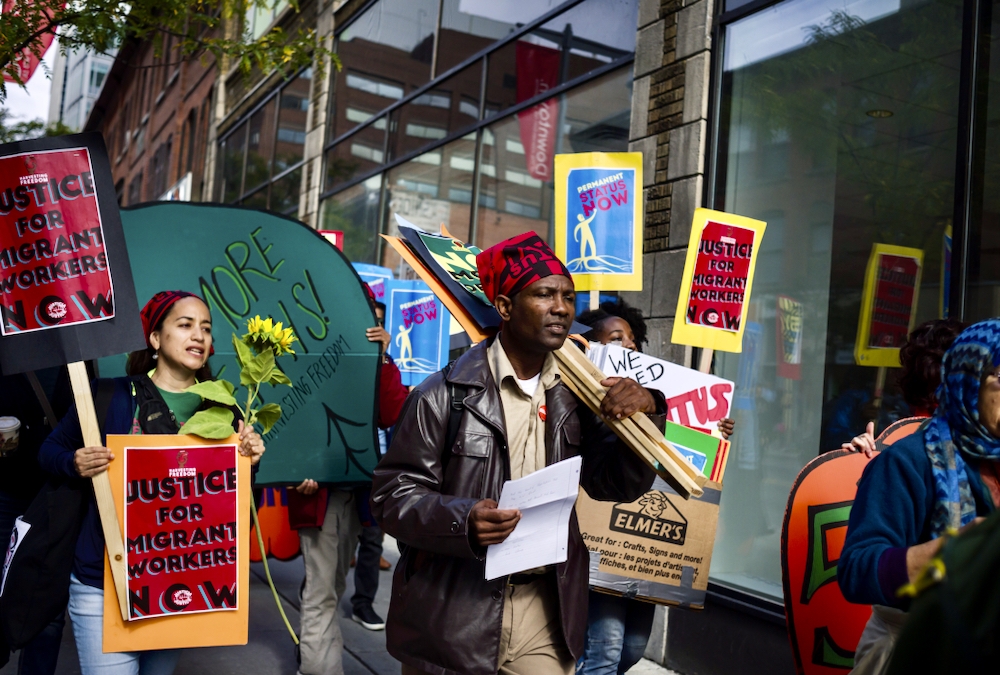This article was produced as part of an Inclusive Journalism Microcredential offered by New Canadian Media and Seneca Polytechnic. Learn more here.
Ontario’s agriculture system is vital to the province’s economy, and while some are trying to improve migrant housing by cutting red tape, one activist says housing is just one part of systemic exploitation.
Ontario’s economy relies heavily on the profits it brings in from agriculture every spring, summer and fall.
According to former Ontario Minister of Agriculture Ted McMeekin, who is now a Hamilton city councillor , agriculture is the top contributor to the province’s gross domestic product, at $42 billion a year.
But behind all of that profit are more than 60,000 temporary migrant workers picking and processing produce. Nearly a quarter of all migrant workers in Canada work in Ontario, according to Statistics Canada.
A large-scale survey of new Canadians last year found housing and cost of living were key challenges newcomers experienced in Hamilton, according to Mohammad Araf of the Hamilton Immigration Partnership Council.
“About four in 10 immigrants we surveyed said their housing was unaffordable, one in four said their housing was not suitable for their needs, and seven in 10 said their income was not sufficient for their needs,” he said.
“These challenges were more pronounced among certain groups of immigrants, including refugees, refugee claimants and temporary foreign workers.”
Canada’s Seasonal Agricultural Worker Program allows employers to hire temporary foreign workers when Canadians and permanent residents are not available.
Employers must provide their temporary foreign workers with on- or off-site housing that is deemed adequate, suitable and affordable as defined by Canada Mortgage and Housing Corporation.
For many migrant workers, work and living situations are closely related, and speaking openly about the conditions of their accommodations can threaten their livelihood.
According to a CBC report in September 2023, UN official, Tomoya Obokata, commented that Canada’s “Agricultural and low-wage streams of the temporary foreign workers program constitute a breeding ground for contemporary forms of slavery.”
The generally low standard of living conditions for migrant workers made the news during the COVID-19 pandemic.
The Reverend Antonio Illas of the Anglican Diocese of Niagara Migrant Farmworkers Project still sees “plenty of room for improvement in migrant farmworkers’ housing in the region.
“I have seen trailer housing that can be compared to living conditions in the developing world, or so-called ‘Third World,’ Illas said. “Several farmers have built new bunk housing, which is great, but still quite insufficient.”
“The agricultural sector receives quite a bit of subsidies from the federal government and other benefits from the provincial governments,” he said.
“I am a strong believer that positive opportunities are there if the agricultural industry and farmers are intentional in funding for rental housing or new housing units in their farmlands.”
Developer fees ‘non-issue’ for migrant workers
In Hamilton, city council is looking at changing bylaws around Farm Labour Residences (FLR). One of those proposed changes would cut some of the red tape that is impeding the building of new residences.

Ward 15 Coun. Ted McMeekin has spearheaded a motion to stop charging developer fees on these residences by classifying them as social housing.
“It was going to cost some of these farms up to $40,000 in development charges [alone],” McMeekin said, adding that under provincial law migrant workers cannot be charged rent.
“This really should meet the classic definition of social housing, and the province doesn’t allow municipalities to charge a development charge on social housing.”
Gabriel Allahdua, a former migrant farm worker and activist with the collective, Justicia for Migrant Workers, said focusing on development charges misses the point of migrant worker’s plight.
He called developer fees “a non-issue” to migrant workers in “the grand scheme of being denied and excluded from so much, all whilst being tied to their employer.”
“If you can’t see that the Canadian farm program is a continuation of the dehumanizing and exploitation of people of colour, then keep yourself distracted by focusing on these fees,” he said.
A communications professional with international experience, and a member of the IABC 500 Club, Shiona helps organizations and entrepreneurs develop and implement long-term communications goals and plans, to bring their key brand and relationship-building messages home.
Cara Nickerson is a multimedia journalist currently reporting for Flamborough Today with Village Media. She was formerly a digital reporter with CBC Hamilton and radio producer with CBC Radio’s Ontario Syndicated Service. She covers stories that celebrate community, current affairs, breaking news and dynamic photojournalism.



